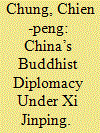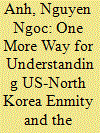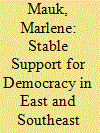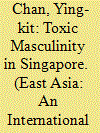|
|
|
Sort Order |
|
|
|
Items / Page
|
|
|
|
|
|
|
| Srl | Item |
| 1 |
ID:
187427


|
|
|
|
|
| Summary/Abstract |
Ever since China has formally joined the WHO-backed global COVID-19 vaccine initiative known as COVAX, there is a presumed notion that China’s vaccine diplomacy will make a significant contribution to the international public good and thus uplift Beijing’s role as the rule-maker of international order. To scrutinize this, the paper asks if China succeeded in proliferating its weaponized vaccine policy to obtain maximum diplomatic gains and soft power projection to intensify its international image, geopolitical power, and domestic politico legitimacy. The authors argue that despite its vaccine diplomacy demonstrated the robust governance capacity and responsibility to be a great power. Yet, Beijing’s geopolitical influence and international image are significantly overrated and not enough to play a more prominent role in the global power fulcrum/equilibrium. On the contrary, China enjoys a leading position on the domestic political front. Its successful portrayal of China’s vaccine provision in the global market and remarkable configuration to leverage a deep-rooted nationalism has fundamentally provided China with a powerful rationale to divert its public’s attention from Beijing’s earlier inadequate handling of the outbreak. The evaluation of the paper reveals that China’s vaccine diplomacy’s influence in promoting international image and geopolitics is limited but has successfully stabilized its domestic political environment and enhanced its domestic legitimacy.
|
|
|
|
|
|
|
|
|
|
|
|
|
|
|
|
| 2 |
ID:
187426


|
|
|
|
|
| Summary/Abstract |
China’s burgeoning economic and security activities abroad have given rise to suspicions and criticisms of its intentions. As Buddhism is a shared faith and heritage among many Chinese; an integral part of national identities of Sri Lanka, Myanmar, Thailand, Laos, and Cambodia; a proud legacy in India; and a major religion in Vietnam, Malaysia, Singapore, Mongolia, Korea, and Japan, winning over the trust and friendship of neighboring Buddhist countries has emerged as an important Chinese diplomatic initiative, especially under the current Xi Jinping leadership’s enterprise to revive the Silk Road. Having over 245 million Buddhists, 28,000 Buddhist monasteries, 16,000 temples, and 240,000 Buddhist monks and nuns makes the promotion of Buddhism a rich source of soft-power, or “soul power,” for China, generated from its heavy investments in building Buddhist institutions and engaging Buddhist groups in these countries. However, there are external and domestic challenges in using Buddhism as a Chinese foreign policy vehicle. The paper analyzes what the objectives of China’s Buddhist diplomacy are; which personnel, organizations, or state bureaus in China make China’s Buddhist diplomacy; how is it carried out; what the targeted institutions and personnel in the affected countries are; the reactions from these countries; and the extent to which a Communist regime is able to carry out its promotion of Buddhism in Asia despite its professed atheism. The analysis is conducted through the spectrum of two major perspectives in international relations literature: neo-realism and constructivism.
|
|
|
|
|
|
|
|
|
|
|
|
|
|
|
|
| 3 |
ID:
187423


|
|
|
|
|
| Summary/Abstract |
In this essay, we attempt to use Alexander Wendt’s Hobbesian culture hypothesis to examine three aspects of US-North Korea relationship: (i) what kind of relationship it has belonged to, (ii) why it has not changed for over past 70 years, and (iii) what possible relationship between the USA and North Korea will be under the Biden Administration. The results show that Hobbesian culture has been dominating US-North Korea relations since 1949 when the USA did not recognize North Korea’s sovereignty and then launched unlimited war against North Korea in late 1950. Then the difference in internalization of the USA and North Korea to Hobbesian culture generated two opposing goals: while the USA pursues interests created by the existence of Hobbesian culture, North Korea pursues interests generated by the end of this Hobbesian culture. This is the main factor that has prevented a structural change over past 70 years. Theoretically, there may be at least three possibilities to change the structure of US-North Korea relations under the Biden Administration. But our examination of these possibilities show that it is hard for these possibilities to come true. It is suggested in this essay that the USA should try to improve its relations with North Korea by increasing US-North Korea interdependence. Once the interdependence is generated, the external restraint will be created. And when great enough, the interdependence will improve their relation and even create a structural change in the further future.
|
|
|
|
|
|
|
|
|
|
|
|
|
|
|
|
| 4 |
ID:
187425


|
|
|
|
|
| Summary/Abstract |
Recent democratic regressions and crises suggest democracy is at risk across East and Southeast Asia. One of the factors that can determine democratic stability are citizens’ attitudes. While previous research has concentrated on support for democracy-in-principle, this contribution argues that it is political trust, i.e. support for democracy-in-practice, which is crucial for democratic stability. For democracies to be stable, political trust should be high as well as rooted in long-term factors like liberal democratic value orientations or social trust to protect it from short-term fluctuations following economic crises or political scandals. This contribution therefore examines not only the current levels and development of political trust but also whether it is influenced more by long-term factors (liberal democratic value orientations, social trust) or short-term factors (economic performance evaluations, incumbent support). The empirical analysis shows political trust in five East and Southeast Asian democracies (Indonesia, Japan, Mongolia, South Korea, Taiwan) to be mostly mediocre and primarily dependent on economic performance evaluations and incumbent support. Among the five democracies, citizens in Japan appear most resilient to democratic regressions; on the other hand, Taiwanese democracy seems least equipped to master future crises.
|
|
|
|
|
|
|
|
|
|
|
|
|
|
|
|
| 5 |
ID:
187424


|
|
|
|
|
| Summary/Abstract |
The #MeToo Movement, which originated in the USA against sexual harassment and violence, has caught on in Singapore. This article suggests that the recent debate on toxic masculinity in the country, brought to public attention in a speech by Corinna Lim, chief of the Association of Women for Action and Research (AWARE), is an extension of the #MeToo Movement. The debate on toxic masculinity has largely revolved around the issue of whether the mandatory National Service (NS), which all Singaporean men have to perform, is a site of toxic masculinity. This article is a preliminary attempt to connect the dots and examine the implications of the debate for civil society, NS, and women’s activism in contemporary Singapore.
|
|
|
|
|
|
|
|
|
|
|
|
|
|
|
|
|
|
|
|
|